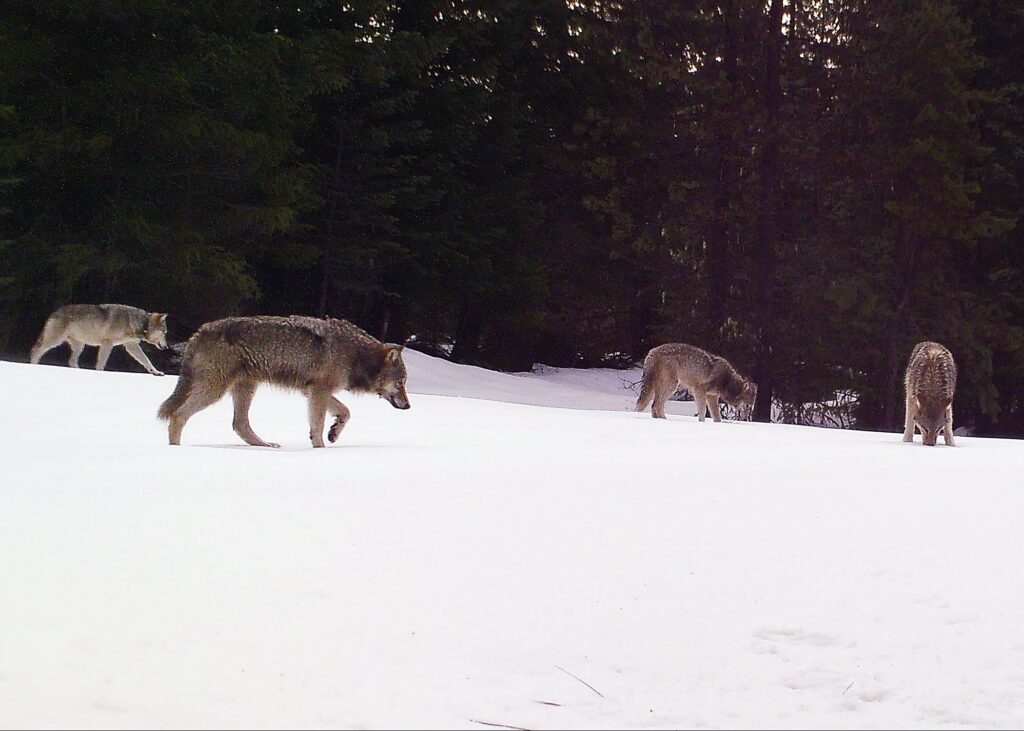Oregon lawmakers have decided that ranchers should get
higher payouts
from the state to recoup their losses for cattle killed by wolves.
If Gov. Tina Kotek signs Senate Bill 777, ranchers will receive up to five times the market value for calves, sheep or goats that are injured or die from
wolf attacks
. The state would use lesser multipliers for mature cattle, working dogs and other livestock.
The Oregon House passed the bill Tuesday, with a bipartisan group of 44 lawmakers voting in favor and 12 Democrats voting against. The proposal has now passed both chambers — marking a likely win for ranchers and a setback for animal rights advocates, who argue that the higher payments would curb ranchers’ incentives to implement strong wolf deterrent measures and result in more wolf deaths.
For years, Oregon ranchers have complained about wolves preying on their cattle, horses and other animals. Because shooting a wolf is against state hunting laws, lawmakers in 2011 agreed to compensate ranchers for the financial loss of any farm animal that dies following a wolf attack.
Ranchers say the money is vital to keeping their operations profitable. In 2023, Oregon counties gave ranchers $70,300 from state coffers for dead or injured livestock or working dogs that experts determined were likely attacked by wolves. Ranchers are currently compensated for the market value of any livestock or working dogs lost to wolves.
That money, ranchers say, does not account for the secondary effects that those deaths can have on other livestock and their owners’ wellbeing. Proponents of the bill said higher payouts would more accurately reflect the amount of time and effort that ranchers devote to raising livestock.
“This mirrors successful frameworks used in Wyoming and Colorado, and it recognizes that a calf isn’t just a commodity,” Rep. Bobby Levy, a Republican from Echo, said Tuesday. “It is the result of years of careful breeding, pasture management, labor and investment.”
Under the bill, the state would be required to spend an amount equal to what they pay ranchers for livestock deaths on non-lethal deterrents or livestock management techniques meant to reduce wolf attacks.
Only ranchers who have “demonstrated implementation of best management practices to deter wolves” would be eligible for compensation. Those efforts could include building fences or installing alarm systems that can deter wolves.
Wildlife advocacy groups heavily opposed the bill. They said that giving such high payments to ranchers would lower their motivation to implement strong non-lethal methods to deter wolves, potentially leading to more cattle and wolf deaths.
“(The bill) does nothing to address the ongoing illegal poaching crisis on wolves in this state, and we believe changes need to be made to the bill,” Michael Dotson, executive director of Klamath-Siskiyou Wildlands Center, wrote to lawmakers in late April. The proposal “will rapidly drain existing funds with the multiplier and could lead to more frustration from all sides of this debate.”
But those advocates only convinced a small minority of lawmakers to vote against the bill. On Wednesday, several legislators of both parties expressed strong support for the bill in floor speeches, while none spoke against it.
Ultimately, 21 House Democrats voted in favor of the bill, saying the potential benefits outweighed the possible consequences. Some pointed out that many cattle ranchers have not participated in the current program, and higher payouts might incentivize more participation and actually lead to fewer wolf deaths.
“If we do this right, we’ll both take the pressure off of our cattle ranchers in this state and the very proud families that have that tradition, but we’ll also have a tool in the toolbox for promoting sensible and successful management awards,” said Rep. Ken Helm, a Beaverton Democrat.
— Carlos Fuentes covers state politics and government. Reach him at 503-221-5386 or
cfuentes@oregonian.com
.
Latest local politics stories
-
Clackamas County Sheriff’s Office faces scrutiny over $7M budget gap
-
Oregon likely to OK unemployment for workers on strike
-
Key Oregon Democrats signal support for public transit, climate-friendly transportation framework
-
Commissioner proposes pausing pay hikes for management to ease Multnomah County budget woes
-
Portland’s brand-new City Council considers bringing in outside consultant to create ‘government reset plan’





More Stories
Oregon lawmakers approve higher compensation for ranchers whose livestock is killed by wolves
Oregon lawmakers approve higher compensation for ranchers whose livestock is killed by wolves
Oregon lawmakers approve higher compensation for ranchers whose livestock is killed by wolves